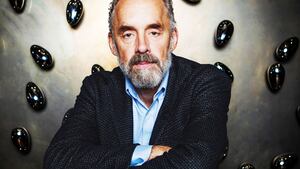Jordan Peterson sees totalitarianism everywhere he looks.
The clinical psychologist and professor—turned best-selling author and self-help guru to disaffected young males and, now, right-wing culture war commentator—argues that vaccine mandates, gender-neutral pronouns, and excesses of compassion (a possible symptom of “female totalitarianism”) are all nudges toward an inescapable descent toward absolute state control.
Peterson’s latest anti-totalitarian campaign focuses on the tyranny of…professional services and accounting firms.
In a recent article for The Telegraph titled, “Peddlers of environmental doom have shown their true totalitarian colours,” Peterson envisions a dystopian near-future in which the international accounting firm Deloitte—working in conjunction with governments and international institutions—imposes a suffocating and economically cataclysmic regimen of eco-mandates around the world.
Deloitte is a “behemoth with numerous and far-reaching tentacles,” Peterson grimly informs us, and it’s part of a global “cabal of utopians operating in the media, corporate, and government fronts, wielding a nightmarish vision of environmental apocalypse.”
Peterson knows a thing or two about nightmarish visions of apocalypse, as he conjures them for a living. In this case, Deloitte is part of an international “Tower of Babel” (along with nefarious “globalist” institutions like the EU) bent on destroying the global economy and rebuilding it around clean industry.
Peterson’s piece focuses on a recent Deloitte report titled, “The Turning Point: A Global Summary,” which he regards as representative of “elite groupthink” causing social upheaval and economic chaos around the world. The report is a typical example of corporate research: here’s a problem, here’s how much damage it can cause, and here’s why our services are part of the solution. But Peterson doesn’t entertain this innocent interpretation—instead, he views “The Turning Point” as a manifesto for globalist repression and domination.
For example, the report states that a transition to cleaner industry would “require governments, along with the financial services and technology sectors to catalyze, facilitate and accelerate progress; foster information flows across systems; and align individual incentives with collective goals.” This is the sort of vague aspirational language common in corporate reports, especially public ones—long on ambition, short on detail. But Peterson regards it as a mission statement for the coming international eco-dictatorship: “A clearer statement of totalitarian inclination,” he writes, “could hardly be penned.”
Peterson presents this screeching alarmism and paranoia as a form of egalitarianism. In response to Deloitte’s claim that people who are “most exposed to the economic damages of unchecked climate change would also have the most to gain from embracing a low-emissions future,” Peterson says: “Really? Tell that to the African and Indian populations in the developing world lifted from poverty by coal and natural gas.”
Peterson doesn’t bother addressing the argument that people in the developing world—especially places vulnerable to rapid sea level rise—will suffer the consequences of climate change most acutely. He rejects the idea that regulation has any role to play in mitigating the effects of climate change: “Help replace dirty energy with clean, if you must, but do it on your own dime.” He says advocates of government action on climate change should take personal steps to reduce their consumption. While they ride to work on their bicycles, Peterson sneers, “I’ll splash you with icy and salty slush as I drive by, in my evil but warm Ford Bronco SUV, and help you derive the consequent delicate pleasure of your own narcissistic martyrdom.”
In his 2018 bestseller, 12 Rules for Life: An Antidote to Chaos, Peterson urges readers to “assume ignorance before malevolence”—a rule he never follows.
He doesn’t believe Deloitte consultants and “like-minded centralists” are trying to do what’s best for the world. They want “enforced privation.” They want to “steal and destroy the energy that makes our lives bearable.” In response to the “centralisers,” “sacrificers of the wealth and property of others,” and “Machiavellian pretenders and virtue-signallers,” Peterson declares that he refuses to “blindly follow your diktats” and “cede to you all the extant power.” He simply won’t allow such evil people—the people who work at Deloitte—to “assume omnipotence and omnipresence.”
Peterson accuses the “peddlers of environmental doom” of attempting to terrify people into adopting their worldview. In response, he terrifies people with hallucinations of a global totalitarian superstate run by Deloitte researchers, progressive politicians, and climate change activists.
He says Deloitte is in no position to predict the future, but apparently believes he’s a competent enough forecaster to warn of an imminent global plunge into totalitarianism. He constantly derides his political opponents as narcissists, but is there anything more narcissistic than the grandiose claim that you’re a dissident in an imaginary global dictatorship and the voice of poor and marginalized people around the world?
“Citizens are waking up to this,” Peterson warns. “Dutch farmers and fishermen are rising up, Canadian truckers are pushing back. Such protests are spreading, and increasing in intensity.” Throughout the piece, Peterson also cites the “yellow vest” protesters in France, Trump voters, and Brexit supporters—all allies in the fight against the dictatorship administered in Brussels and Deloitte boardrooms around the globe. He appears to believe that populists everywhere are united in the campaign against globalist totalitarianism, and he has appointed himself their official representative: “Leave us alone. Or reap the whirlwind. And watch the terrible destruction of what you purport to save, in consequence.”
For an intellectual who purports to be so concerned about the power wielded by others, Peterson sure seems comfortable issuing grave threats on behalf of millions—billions?—of people. And in doing so, he produced a piece of work more fatalistic and hysterical than anything a corporate consultant could imagine.









